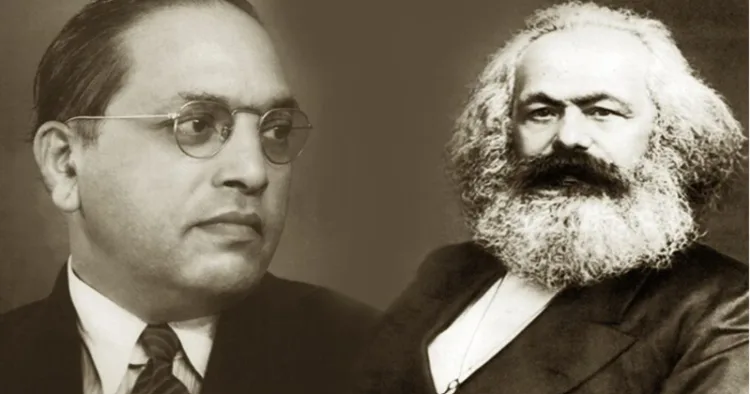On the Mahaparinirvan Diwas, we honour the life and legacy of Dr Bhimrao Ambedkar, a visionary who sought to uplift the oppressed and champion justice, equality, and fraternity for all. His profound understanding of Bharat’s socio-cultural landscape led him to reject foreign ideologies that did not align with the country’s spiritual heritage. Among these, Marxism and Communism stood out as ideologies that Dr Ambedkar wisely identified as unsuitable for Bharat’s unique context. His choice to embrace Buddhism over these ideologies was not just a personal decision but a revolutionary one that reshaped the future of millions, offering a path of peace, dignity, and social harmony.
Dr Ambedkar, deeply aware of the limitations of Marxism, rejected its foundation in class struggle and its emphasis on economic revolution as the sole means of achieving social justice. While Marxism’s focus on overthrowing capitalist structures may have worked in European contexts, Dr. Ambedkar understood that Bharat’s struggle was fundamentally different. The issues of caste-based discrimination, social hierarchy, and cultural alienation required a more holistic, peaceful solution rooted in Bharat’s own civilizational wisdom.
Dr Ambedkar’s rejection of Marxism was grounded in his belief that Buddhism, with its teachings of equality, non-violence, and compassion, provided the only suitable path for social transformation in Bharat. Marxism, focused primarily on class struggle and economic revolution, failed to address the deeper issues of social injustice ingrained in the caste system. Dr Ambedkar saw that true liberation could not be achieved by merely altering economic systems; it required a fundamental shift in the mindset and spiritual framework of society. Buddhism, with its emphasis on inner transformation, was the perfect vehicle for such a shift.
Dr Ambedkar realised that class struggle and violent revolution, central to Marxist thought, risked creating more division in a society already fractured by caste and social inequalities. Buddhism, on the other hand, called for a peaceful transformation—a revolution of the mind, where every individual could live in harmony, free from the shackles of social hierarchy and discrimination.
The Relevance of Buddhism in Bharat’s Future
By embracing Buddhism, Dr Ambedkar set forth a vision that transcended the limitations of Marxism. In contrast to the violent class warfare promoted by Marxists, Buddhism offered a compassionate, inclusive framework for social justice. Dr Ambedkar’s path was one of peaceful reformation, grounded in the principles of equality and fraternity—values that could only thrive in Bharat through the wisdom of the Buddha.
Dr Ambedkar himself encapsulated his belief in Buddhism with the following words:
“Buddhism is the greatest gift that India has given to the world. It teaches us that the cure for inequality is not through violence, but through peace, love, and understanding.”
This statement underscores Dr. Ambedkar’s vision of a society where true liberation could only be achieved when individuals are empowered not by economic revolutions, but by spiritual awakening—the very essence of Buddhism.
Buddha Over Marx: The Path to True Liberation
Dr. Ambedkar’s decision to prioritize Buddhism over Marxism was not merely ideological; it was a strategic vision for Bharat’s future. Marxist doctrines, rooted in European contexts, could never address the deep-seated social inequalities that defined Bharat. On the other hand, Buddhism offered a unifying philosophy, advocating for the elimination of social divisions and the promotion of universal equality.
Dr. Ambedkar saw in Buddhism the key to breaking the chains of caste and achieving a truly egalitarian society—a vision that could not be realized through the violent revolution that Marxism proposed.
On this Mahaparinirvan Diwas, we remember Dr. B.R. Ambedkar’s life and ideas as a profound blueprint for Bharat’s future. His rejection of Marxist and Communist ideologies, coupled with his embrace of Buddhism, offers a path that is peaceful, inclusive, and transformative. Dr. Ambedkar’s vision of social justice was not limited to economic change—it was about a fundamental shift in the mindset of society, based on the timeless principles of equality, non-violence, and fraternity.
As we honour Dr Ambedkar, let us renew our commitment to his vision—a Bharat where every individual, irrespective of caste or creed, can live with dignity, and where fraternity is not just a word but a living principle. Dr. Ambedkar’s legacy is not just about fighting for equality in the material world but also about spiritual awakening through the path of Buddhism—the true path to liberation for Bharat.




















Comments